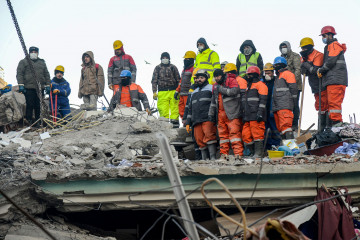

Twenty eight year old Jawid Mohammadi was supposed to be celebrating his 29th birthday in a month. But the deadly earthquake in the Malatya province of Turkey meant that his loved ones would not get to see him celebrate another year of life.
He had been living in this east-central city of Turkey for twenty years, working in the immigration office of the province, about 700 kilometres away from the capital Ankara. On the last night of his life, Jawid had been working a night shift and returned home at midnight.
The young father also lost his three sons (5, 3 and 2 years old) in the 4:42 am earthquake on February 6. Even though his eyes were open and he was breathing for a few moments after being rescued following the earthquake, he died in the ambulance on the way to the hospital.
"Jawid was a patient man and was both father and mother to his children, after losing his wife two years ago during the birth of his last son," his cousin Sohail Ahmad Ahmadi tells The New Arab.
Sohail says that a day before the deadly earthquake, he had talked with his cousin on the phone for more than an hour. He was planning to go to Malatya to stay with him. "We would sit, drink coffee and laugh together," he said.
Sohail, who lives in the city of Yalova in Turkey and is a lawyer, says the the bodies were not handed back to the family straightaway as they had to follow government principles. But the body of Jawid's three-year-old son is still under the rubble and has not been found.
"I usually don't cry because of problems, but when I got the news about my cousin, I cried, both for him and for his small children," Sohail said.
"At the moment, I have only one photo of my cousin after he was pulled out from under the rubble, a photo of him with his eyes open and alive. It's hard for me to see the picture again."
Sohail says that the situation in Malatya was extremely bad and assistance had not arrived properly.
"The tragedy in Turkey broke our hearts. The situation is very painful for me, not only because of the death of my cousin, but also because of the thousands of lives lost."
Sohail adds that the loss of his cousin will remain in his heart forever.
More than 47,000 people have been killed while hundreds of thousands of homes have been damaged or destroyed after the devastating 7.8 magnitude earthquake hit Southern Turkey on February 6, affecting hundreds of thousands of people across Turkey and Syria.
Another earthquake then struck on February 20 with a magnitude of 6.4 near the southern Turkish city of Antakya but was felt in Syria, Egypt and Lebanon, leaving six people dead and more than 290 people injured.
|
Asadullah Imami, a member of an aid organisation based in Istanbul, said that they had collected some cash and sent it to the four most affected provinces.
"Unfortunately, some people are still trapped under rubble and the collapse of tall buildings has made the rescue operation difficult," Asadullah told The New Arab via WhatsApp.
Asadullah, who has been following the relief process carefully, says that currently in some provinces, search and rescue dogs have been brought in from foreign countries to help find people still stuck under the rubble. But he emphasised that in order to prevent more casualties, there is an urgent need for more aid teams and special tools to rescue those who are still alive under the rubble.
The earthquake tragedy in Turkey has saddened thousands of hearts globally and affected millions of others emotionally, and for Sohail, the loss of loved ones will remain with him forever.
"Jawid was hoping for a promotion soon at his job, a wish that is now buried forever," Sohail concluded with sadness in his voice.
Abu Muslim Shirzad is a university lecturer and researcher on security and political matters in South Asia, Central Asia and the Middle East.
Follow him on Twitter: @MuslimShirzad





 Follow the Middle East's top stories in English at The New Arab on Google News
Follow the Middle East's top stories in English at The New Arab on Google News


